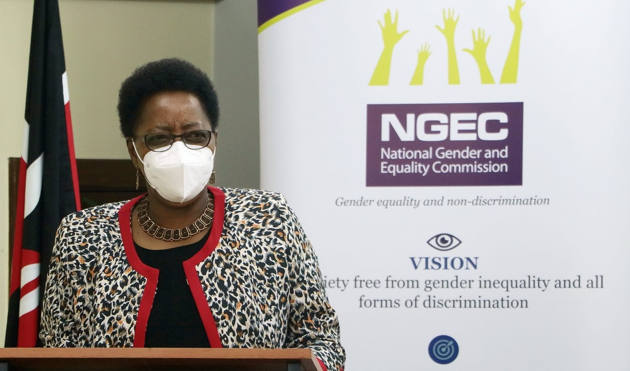STATEMENT ON OBSERVANCE OF THE WORLD ELDER ABUSE AWARENESS DAY
The National Gender and Equality Commission (NGEC) joins Older Members of Society in Kenya, and the world at large in commemorating the 2023 World Elder Abuse Awareness Day (WEAAD). The World Elder Abuse Awareness Day takes place annually on 15th day of June. It serves as a platform for the world to voice their collective opposition to elder abuse. The theme for 2023 is: "Closing the Circle: Addressing Gender-Based Violence (GBV) in Older Age Policy, Law and Evidence-based Responses". It calls for urgent attention to prevention and response to GBV among older persons through strengthening of policy and legal instruments, and evidence-based programming.
Gender Based Violence (GBV) is recognized as a fundamental violation of human rights that occurs within all ages across ethnicity, race, sexuality, gender identity, and socio-economic backgrounds. For older persons, GBV is considered to be a distinct form of abuse that requires specific attention. Elder abuse encompasses various forms of mistreatment, such as physical, psychological, sexual, and financial abuse, as well as neglect and abandonment. Most older persons especially women are likely to suffer in silence as GBV is confounded by stigma, and social and cultural norms that instill fear among victims to report or ask for help. GBV has serious physical and mental health, financial, and social consequences, including, injuries, premature mortality, depression, cognitive decline, financial devastation, and loss of dignity and self-esteem.
Globally, the full scope of GBV among older persons is still unknown and remains a low priority. The World Health Organization, 2022, estimates that every year, 1 in 6 people aged 60 years or more experience some form of abuse in community settings they live in[1]. In Kenya, GBV among older persons is largely perpetuated by property ownership related disputes, retrogressive cultural practices including suspicion that old persons are witches and bring about bad luck, influence of drugs and substance abuse, and over-dependency on family members, among others. Despite the lack of comprehensive data on elder abuse in Kenya, reports from various sources show that older persons encounter abuse from caregivers, the community, and own families which make it difficult for older persons to report such incidences to authorities. Older women and suffer more as they are charged with care responsibilities.
The Government of Kenya has put in place a number of legal and policy measures to protect the rights and socio-economic well-being of Older Persons including protection from abuse and violence. Article 57 of the Constitution of Kenya, 2010 requires the State to take measures to ensure the participation of the older members of society in affairs of the society, the pursuit of personal development, care, and assistance, to live in dignity and respect, and to be free from abuse and to receive reasonable care and assistance from the family and the State. The Sexual Offences Act. No. 3 of 2006, and the Protection Against Domestic Violence Act. No. 2 of 2015 explicitly prohibit violence against all persons irrespective of their gender, age among other grounds. Some of the policy instruments include, the National Social Protection Policy, 2011, the National Policy for Prevention and Response to GBV, 2014 and the National Policy on Older Persons and Ageing, 2018 among others. Kenya is also a signatory to International and Regional Human Rights Declarations and Treaties that advocate for the rights of older persons. In 2002 the country adopted the Madrid International Plan of Action on Ageing (MIPAA) that obligates the state to protect older persons from violence, sexual abuse, and discrimination based on age.
In 2022 Kenya ratified the Protocol to the African Charter on Human and Peoples’ Rights on the Rights of Older Persons in Africa.
Despite the policy, legal and programmatic safeguards, older members of society in Kenya continue to face multiple discriminations based on their age, and suffer violence. Cases of bodily and psychological harm to older persons, non-authorized access to personal data, forced transfer of property, withdraw of care and support, and sexual and emotional violence are prevalent. The self-stigma, and aspirations to protect the identity and image of the perpetrators especially when they are relatives and persons known to the victims, has restricted ability of older persons from reporting violence. This year’s commemorations provide an opportunity for Kenya to reflect, take policy, legal and programmatic stock, and scale-up interventions that would further protect older persons from violence and harm.
As part of Kenya’s renewed commitment to the full implementation of the UN Decade of Healthy Ageing 2021–2030, we implore on all actors (state, private sector, media, academia, and communities) to refocus their investments to; 1) combat ageism and create a nation of all ages 2) generate more and better data on prevalence, risk and protective factors on abuse of older persons, 3) develop and scale up cost–effective solutions; 4) make an investment case for addressing healthy ageing[2]. On our part, the Commission is keen to monitor the progress made by the State towards the implementation of these priority areas and in elimination of violence and abuse against older persons.
SIGNED
Dr. Joyce M. Mutinda PhD, EBS
Chairperson
[1] World Health Organization, 2022
[2] Decade of Healthy Ageing. (2022). Tackling abuse of older people: Five priorities for the UN Decade of Healthy Ageing (2021–2030)


Comments